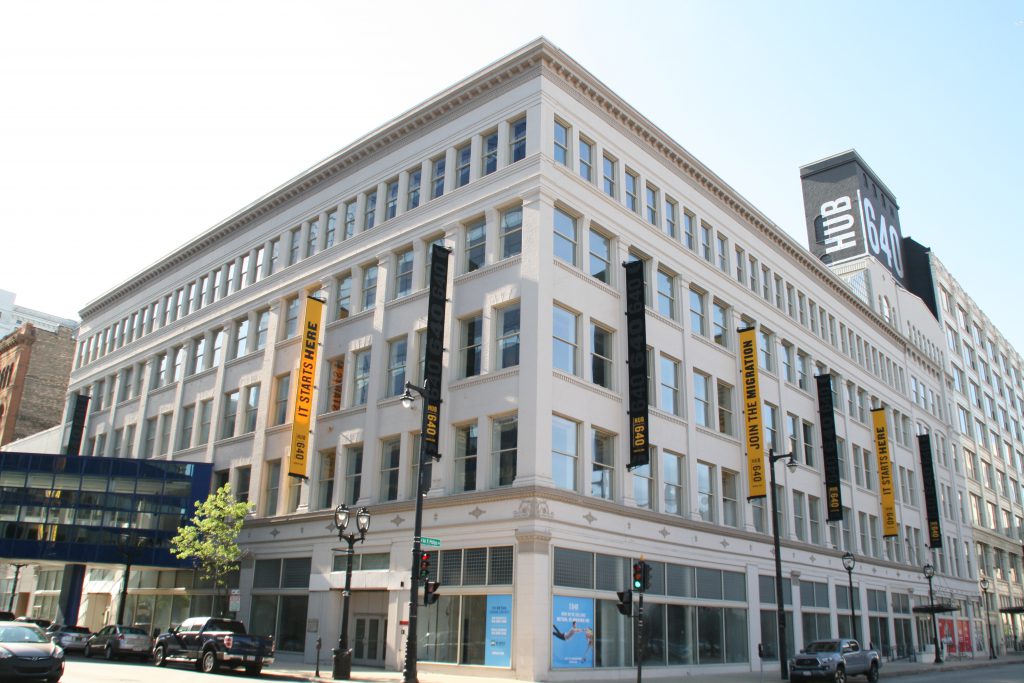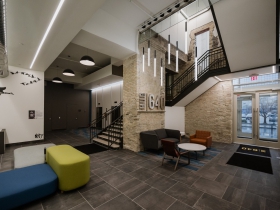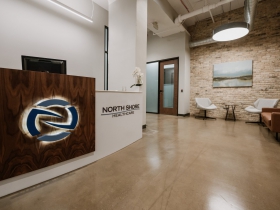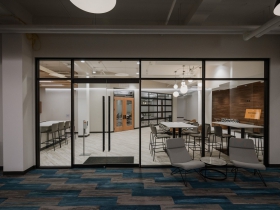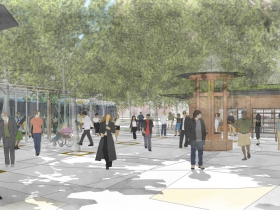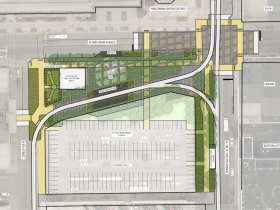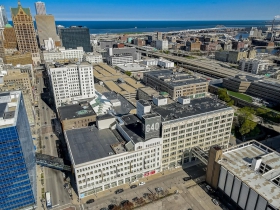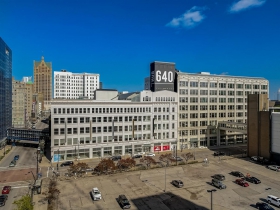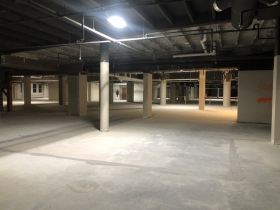Council Approves Fiserv’s Suburb-to-City Move
Global company will fill former Boston Store, be joined by new downtown Kohl's.
The Milwaukee Common Council completed its part of a complicated agreement Tuesday to bring the headquarters of financial services technology company Fiserv to downtown Milwaukee.
Without debate, the council unanimously adopted a tax incremental financing (TIF) district that would provide the company with $7 million over a period of 20 years. The agreement also dedicates $4.6 million in increased tax revenue from the development toward public improvements in the area, including redesigning W. Michigan St., improving Zeidler Union Square and creating Vel Phillips Plaza.
Fiserv would lease 144,000 square feet of space in the eight-story HUB640 building at the corner of W. Wisconsin Ave. and N. Vel R. Phillips Ave. and invest at least $37 million into the project. It’s one of several major office developments the 42,000-employee company is engaging in across the globe.
Last week a company executive told a council committee that the suburbs-to-city move would help attract employees, but also said the subsidy was a key enticement.
“We felt like attracting young, diverse, dynamic talent, we had reached a ceiling in our current location,” said Fiserv senior vice president Ryan Smith on Dec. 6 to the Common Council’s Zoning, Neighborhoods & Development Committee. “We felt it no longer reflected us, who we are as this technology, forward-thinking company.”
The company’s move has been several years in the making. In 2017 the Fortune 500 company confirmed it was considering multiple sites in Milwaukee, but never moved. In 2019 it acquired First Data Corporation for $22 billion and set about restructuring or closing several dozen of its offices spread across the country.
The new Milwaukee office will be far from the company’s largest, but, based on the city’s term sheet, it will be the only one that the company can call its “global headquarters.” The term sheet says Fiserv is expected to locate employees working in finance, communications, IT, product development, human resources, benefits and legal services in the new office.
In landing Fiserv, the city is also helping bring new life to what was a largely vacant building. The building was previously home to the flagship Boston Store and parent company Bon-Ton’s corporate headquarters, until the latter’s 2018 liquidation. Unlike when Bon-Ton closed, the surrounding Westown neighborhood is now on a major upswing. The Bradley Symphony Center opened, The Shops of Grand Avenue is now The Avenue, the Wisconsin Center is being expanded and Milwaukee Tool opened a major downtown office.
Kohl’s, in July, announced it would open a smaller-format department store on the northern half of the first floor. Fiserv would lease the southern portion of the first floor as a lobby with the offices and cafeteria on the third, fourth and fifth floors.
Working with Founders 3, property owner North Wells Capital successfully attracted North Shore Healthcare, Eight Eleven Group and Abacus Architects to the building. Engberg Anderson Architects and Kelly Construction & Design led the design and construction on the redevelopment. CBRE represented Fiserv in its location search.
The complex, legally three condominiums, is expected to climb in assessed value from $26.4 million to $59.6 million. Included in the district is the 74-unit apartment complex at the top of the building. Developed by the Mandel Group nearly two decades ago, its units are now owned by North Wells.
The agreement is structured as a developer-financed TIF district. Fiserv would be eligible to collect up to $7 million plus 4.5% interest over a period of no more than 20 years. Unlike a traditional TIF district, the agreement places no risk on the city if the development fails to yield the expected increase in property tax revenue. The existing property tax revenue from the property would continue to flow to the city and other property taxing entities under the proposal, with only the increase diverted.
The agreement sets a four-year ramp-up period that starts at 580 employees in 2024 and grows to the full amount of 780 jobs in 2027. Fiserv, Smith told the committee last week, hopes to begin moving in at the end of 2023.
Given a shift to remote work, the agreement includes a detailed structure to determine who qualifies as an employee.
A full-time employee is defined as any employee who works at least 35 hours per week, receives healthcare benefits and is paid more than 150% of the federal minimum wage. Workday occupancy at the facility must be at least 60% of the reported full-time employee count. Similar to the Milwaukee Tool agreement, Fiserv can count employees who live in the city but work from other facilities or at home as part of the total.
Smith said of the current workforce, 136 employees live in Milwaukee. He expects that to grow, in part because the company might struggle to retain certain workers with the move.
An open question remains on whether the company will adopt a “community benefits agreement” for its contracted service employees. The agreement requires the company to pay employees working in janitorial, food service or security roles a minimum of $15 per hour, with annual increases of at least 2% starting in 2025. It also must comply with the “employment protections and sourcing methods contemplated by the CORE resolution.” The council-created 2019 CORE resolution calls for a $15-per-hour minimum wage and union-like job protections for downtown workers.
“I don’t know that we’re saying we’re not going to do a community benefits agreement,” said Smith. He said it was just too early. “We are committed to continuing those conversations.”
The terms of the deal require a handful of other provisions of Fiserv, including having 40% of the project’s construction work hours performed by unemployed or underemployed city residents. Fiserv is required to maintain an average of three tech apprenticeships as part of the subsidy and provide small business resources and counseling at the Near West Side Partners‘ Concordia 27 development.
For additional information on the proposed public improvements or the building’s history, see our coverage from last week.
A copy of the proposed TIF district authorization document is available on Urban Milwaukee.
HUB640 Redevelopment Photos
2019 Vel Phillips Plaza Renderings
HUB640 Aerial Photos
Former Boston Store
Political Contributions Tracker
Displaying political contributions between people mentioned in this story. Learn more.
- May 20, 2016 - Robert Bauman received $50 from Peter Rickman
Eyes on Milwaukee
-
Church, Cupid Partner On Affordable Housing
 Dec 4th, 2023 by Jeramey Jannene
Dec 4th, 2023 by Jeramey Jannene
-
Downtown Building Sells For Nearly Twice Its Assessed Value
 Nov 12th, 2023 by Jeramey Jannene
Nov 12th, 2023 by Jeramey Jannene
-
Immigration Office Moving To 310W Building
 Oct 25th, 2023 by Jeramey Jannene
Oct 25th, 2023 by Jeramey Jannene


